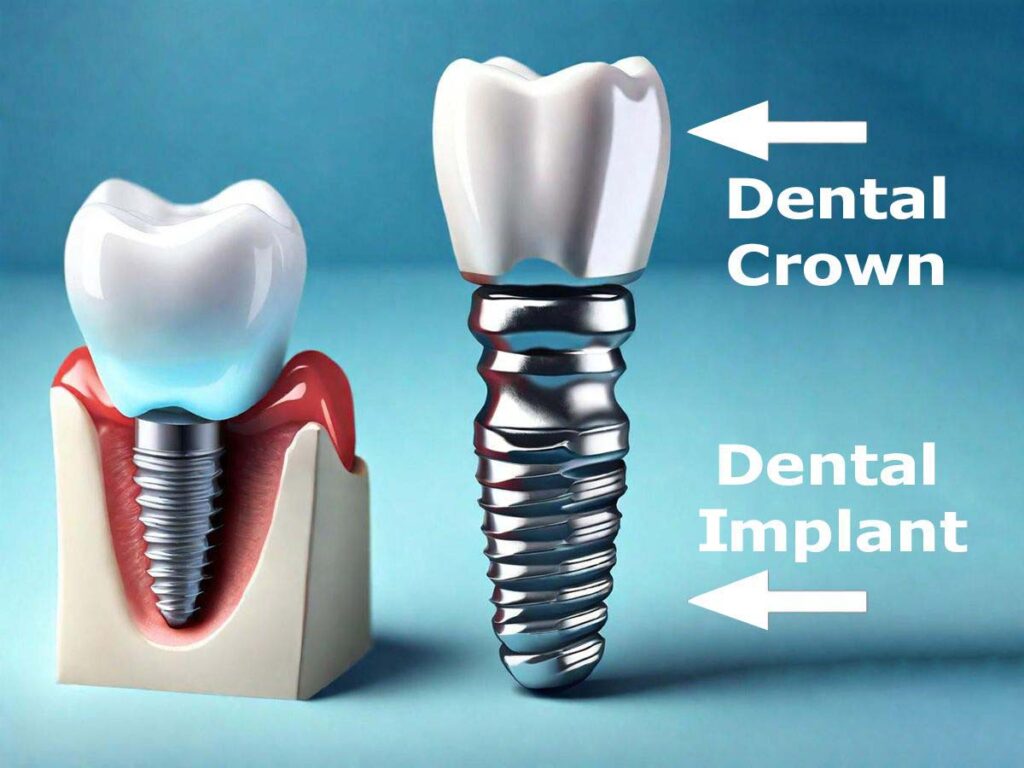
Dental Crowns Vs. Dental Implants: Finding the Right Solution
A dental crown is a cap that replaces and covers the top part of a tooth; a dental implant is an artificial tooth that replaces the entire tooth.
This article will help you understand more about the differences and similarities between a tooth crown and a tooth implant. However, your dentist will help you learn the best dental procedure for your situation.
For an initial overall statement, dental crowns are commonly used for cosmetic reasons or to strengthen a tooth after a root canal or serious chip. Denal implants are the better solution when the whole tooth must be removed due to injury, decay, or trauma. Implants are ideal for replacing missing teeth or teeth that are too heavily damaged to repair using other techniques. Crowns are often used to cover discolored, decayed, chipped, or cracked teeth that still have a strong root.
Let’s start by aligning on a definition of dental crowns.
What is a Dental Crown Procedure?
Dental crowns are hollow, false teeth that fit over existing teeth after they’ve been trimmed and shaped. A crown, also known as a “dental cap” is one type of dental restoration that fully caps or encircles a tooth or dental implant. It may be needed if a large dental cavity threatens the health of a tooth to finish root canal treatment by covering the exposed tooth with a crown or completing a dental implant restoration.
A fixed dental cap is joined onto a patient’s neighboring abutment teeth (crowned teeth). It consists of three primary units: the false tooth or teeth (called a pontic) and two abutment crowns. The style of a crown bridge will be determined based on the strength and health of the abutment teeth and other factors. Your personal cosmetic smile goals will also be considered.
Dental crowns provide about 2 millimeters thick shells, covering an entire tooth’s top surface.
Today, crowns, as well as the advantages of dental implants run much deeper than their cosmetic appeal. Here’s a quick comparison chart and overview of dental implants and crowns.
Table Comparing Dental Crowns to Dental Implants
| Comparison | Dental Implants | Dental Crowns |
|---|---|---|
| Common Use | Implants are for replacing missing teeth. | Crowns are for repairing damaged teeth. |
| Procedure Differences | Dental implants require a surgery for placement. | A dental crown procedure is simpler; it requires fewer materials and steps. |
| Structural Differences | Implants consist of three components: the implant post (artificial root), the abutment (connector), and the crown. | Crowns are a single unit that is secured over a natural tooth or an implant. A dental crown procedure is simpler; it requires fewer materials and steps. |
| Impact on Jawbone | Preserve remaining jawbone and stimulate bone density by exerting pressure on the jawbone during chewing and biting. | Dental crowns can help stimulate jawbone growth when used along with implants to replace missing teeth. |
| Comfort | Fit, feel, and function more like natural teeth. | It can feel unnatural if the shape of the crown is slightly different from the shape of your tooth before it was crowned. |
| Chewing Function | Strong, stable, and securely attached to the jaw to aid speaking and chewing functions. | They improve speaking and chewing function without being attached to the jaw. |
| Tooth Root | If the existing tooth root is too compromised, a dental implant is the best option for replacing the entire tooth and root system. | If the existing tooth root is still healthy, often a permanent crown placed. |
| Age Appropriate | Typically wait until around 18-21 years of age when the jawbone is fully developed. This ensures the implant has a solid base to integrate with. | A dental crown procedure can be done at any age if needed. |
| Duration | When properly placed with modern technology, dental implants may last a lifetime with daily care. | Dental crowns can be a long-term fix for teeth. The average lifespan of a dental crown is typically between 5 and 15 years, but with proper care, they can last upwards of 25–30 years. |
| Healing Time | Implants often require multiple visits over several months, since implant integration with the jawbone takes time. | Crowns can usually be placed in one or two appointments, depending on the type of crown. |
| Stress Factors | Excessive stress during the implant placement and healing process on prosthetic components can lead to implant abutment screw loosening. | Excessive stress on the crown restoration can lead to the loss of crown retention. |
| Cost | Dental implant costs may run between $2,500 and $4,500 and involve additional costs of a root canal. | Less expensive; dental crowns typically cost between $1,500 and $2,500. |
| Replacement | Implants generally have a longer lifespan. | Crowns may need replacing sooner due to wear and tear, underlying or emerging tooth issues. |
Answering Common Questions About Tooth Crowns
Is a tooth crown better than a dental implant?
The answer depends on your oral health, budget, and desired outcome. If your existing tooth root is relatively healthy, a permanent crown placement may suffice. Dental crown procedures may be considered for a single anterior implant placement.
However, if your existing tooth root is too compromised, a dental implant is the best long-term value and solution. Both procedures benefit from CBCT scans for precision dentistry during a tooth repair and replacement.
What is the black line around my crown?
If a black line forms, it is typically because the metal from the crown is showing through. Dental crowns can be made from porcelain, porcelain fused to metal, or all-metal alloy. This occurs more often with older dental crown constructions when made of porcelain fused to metal. When a person’s gumline moves and recedes over time, this metal may become exposed and form this “line.” By using porcelain when placing dental crowns, you gain more pleasing results and avoid the risks of a black line.
Can you get a tooth crown without an implant?
Yes, a tooth crown may be recommended without an implant if the tooth’s root structure is still intact. Traditionally, crowns are attached directly to a natural tooth via a special oral cement and do not require an implant post. However, a dental crown is vital in completing a dental implant placement. In this case, an implant abutment is a small peg-like device that connects the implant post with the outer crown.
A dental crown relies on your natural teeth as support. Your dentist will carefully consider your situation before recommending any type of dental restoration. Either or both a dental crown and oral implant can be used to improve occlusion and orofacial aesthetics.
Do dental crowns work with full-arch dental implants?
Dental crowns are an essential step when restoring damaged teeth by undergoing a full-arch reconstruction. Traditionally, they have been used with dental bridges or to complete dental implants. However, an implant or crown may be indicated on a case-by-case basis. For example, a front tooth smile makeover may be fixed with a porcelain veneer, while a full-mouth reconstruction typically involves multiple crowns. The best results are always obtained by examining each tooth, patient goals, and oral health.
When initially comparing crowns vs implants, crowns can be a less invasive and more affordable option. However, it is more important to consider your overall needs and long-term value. The above comparison table makes it easy to see why many people consider dental implants a long-term investment in themselves. Dental implants are an investment worth making for those who want a permanently fixed solution that’s the next best thing to their natural teeth.
In dental restorations, implants provide durability and longevity, where as crowns are a cost-effective solution.
SUMMARY: Crowns vs Implants
Innovative treatments for compromised or missed teeth, advanced dental technology, and enlisting the skills of a dental implant specialist are important considerations when weighing your options.
To assess the benefits of dental implants vs. dentures for you, schedule your free consultation at Montgomery Dental Care today. The opportunity to ask your questions and get answers is a great way to learn if crowns or dental implants are your best option.
Montgomery Dental Care uses advanced technology for cutting-edge dental implant treatment in Woodbury, MN. Find out more about your options.




